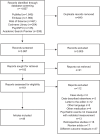Neuropsychiatric Adverse Effects of Synthetic Glucocorticoids: A Systematic Review and Meta-Analysis
- PMID: 38038629
- PMCID: PMC11099480
- DOI: 10.1210/clinem/dgad701
Neuropsychiatric Adverse Effects of Synthetic Glucocorticoids: A Systematic Review and Meta-Analysis
Abstract
Context: Synthetic glucocorticoids are widely used to treat patients with a broad range of diseases. While efficacious, glucocorticoids can be accompanied by neuropsychiatric adverse effects.
Objective: This systematic review and meta-analysis assesses and quantifies the proportion of different neuropsychiatric adverse effects in patients using synthetic glucocorticoids.
Methods: Six electronic databases were searched to identify potentially relevant studies. Randomized controlled trials, cohort studies, and cross-sectional studies assessing psychiatric side effects of glucocorticoids measured with validated questionnaires were eligible. Risk of bias was assessed with RoB 2, ROBINS-I, and AXIS appraisal tool. For proportions of neuropsychiatric outcomes, we pooled proportions, and when possible, differences in questionnaire scores between glucocorticoid users and nonusers were expressed as standardized mean differences (SMD). Data were pooled in a random-effects logistic regression model.
Results: We included 49 studies with heterogeneity in study populations, type, dose, and duration of glucocorticoids. For glucocorticoid users, meta-analysis showed a proportion of 22% for depression (95% CI, 14%-33%), 11% for mania (2%-46%), 8% for anxiety (2%-25%), 16% for delirium (6%-36%), and 52% for behavioral changes (42%-61%). Questionnaire scores for depression (SMD of 0.80 [95% CI 0.35-1.26]), and mania (0.78 [0.14-1.42]) were higher than in controls, indicating more depressive and manic symptoms following glucocorticoid use.
Conclusion: The heterogeneity of glucocorticoid use is reflected in the available studies. Despite this heterogeneity, the proportion of neuropsychiatric adverse effects in glucocorticoid users is high. The most substantial associations with glucocorticoid use were found for depression and mania. Upon starting glucocorticoid treatment, awareness of possible psychiatric side effects is essential. More structured studies on incidence and potential pathways of neuropsychiatric side effects of prescribed glucocorticoids are clearly needed.
Keywords: anxiety; depression; dexamethasone; glucocorticoids; neuropsychiatry; prednisone.
© The Author(s) 2023. Published by Oxford University Press on behalf of the Endocrine Society.
Figures






References
-
- Genees- en hulpmiddelen Informatie Project (GIP) databank . Diemen, The Netherlands: The National Health Care Institute. Accessed July 31, 2023. https://www.gipdatabank.nl/databank.asp.
-
- Judd LL, Schettler PJ, Brown ES, et al. Adverse consequences of glucocorticoid medication: psychological, cognitive, and behavioral effects. Am J Psychiatry. 2014;171(10):1045‐1051. - PubMed
-
- Fardet L, Petersen I, Nazareth I. Suicidal behavior and severe neuropsychiatric disorders following glucocorticoid therapy in primary care. Am J Psychiatry. 2012;169(5):491‐497. - PubMed
-
- Meijer OC, de Lange EC, Breimer DD, de Boer AG, Workel JO, de Kloet ER. Penetration of dexamethasone into brain glucocorticoid targets is enhanced in mdr1A P-glycoprotein knockout mice. Endocrinology. 1998;139(4):1789‐1793. - PubMed
Publication types
MeSH terms
Grants and funding
LinkOut - more resources
Full Text Sources
Medical

